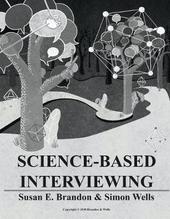
|
Science-Based Interviewing
Paperback / softback
Main Details
| Title |
Science-Based Interviewing
|
| Authors and Contributors |
By (author) Susan Brandon
|
|
By (author) Simon Wells
|
| Physical Properties |
| Format:Paperback / softback | | Pages:282 | | Dimensions(mm): Height 279,Width 215 |
|
| Category/Genre | Business communication and presentation |
|---|
| ISBN/Barcode |
9781543973440
|
| Classifications | Dewey:158.39 |
|---|
| Audience | |
|---|
|
Publishing Details |
| Publisher |
BookBaby
|
| Imprint |
BookBaby
|
| Publication Date |
2 September 2019 |
| Publication Country |
United States
|
Description
This book is about how to talk with people to learn what they know, what they've done, and what they believe about particular events, persons, plans or activities. It may be useful in law enforcement, intelligence, and industry (e.g., litigation, insurance fraud, human resources) contexts. The content is based entirely on research supported by U.S.- and U.K.-sponsored social and behavioral research that is publicly available; these references are included in the text. Also included are suggestions for instruction and practice. The first five chapters follow the course of an interview, beginning with planning (Chapter 2), impression management (Chapter 3), developing rapport (Chapter 4), showing active listening (Chapter 5), eliciting a narrative (Chapter 6), and good questioning tactics (Chapter 7). Chapter 8 describes how to create cooperation between the interviewer and the subject, and what to do in instances where the subject is less than cooperative. Chapter 9 provides methods of assessing whether the subject's story is likely to be true. Each of these chapters are followed by a set of exercises. The subsequent chapters provide information on topics that we have been asked about in classes we have taught based on the material in this book: what are the characteristics of good interviewers (Chapter 10), why people confess (or not) (Chapter 11), how memory works (Chapter 12), and the likely impacts of personality (Chapter 13), mental health disorders (Chapter 14), and drugs and alcohol (Chapter 15) on interview outcomes. Chapter 16 provides a brief overview of the polygraph. Chapters 17 and 18 offer brief histories of interrogations in the U.S. and the U.K., respectively.The authors have knowledge and expertise in both the underlying science and in the application of these methods in the real world.
Author Biography
Susan E. Brandon, Ph.D., is co-founder of SyncScience LLC, based in the U.S. Dr. Brandon managed a U.S. government research program on interviewing and interrogation methods for ten years. For the last eight of those ten years, she served as Research Program Manager for the High-Value Detainee Interrogation Group (HIG), an inter-agency capability set up by the Obama Administration in 2009 to ensure lawful, rights-respecting interrogations of individuals assumed to have information of significant threats to the U.S. and its allies either within the U.S. or abroad. This Group also is mandated to conduct scientific studies to improve rapport-based interrogation methods. Prior to this, Dr. Brandon was a Program Manager at the National Institutes of Mental Health and Assistant Director for Social, Behavioral and Educational Sciences at the White House Office of Science and Technology Policy (2003 - 2006). She served two years in the Science Directorate of the American Psychological Association. Prior to that, she was on the faculty of the Department of Psychology Behavioral Neuroscience Program at Yale University.Simon Wells is Co-Director of Acacia 17, based in the U.K. He previously served with London's Metropolitan Police, retiring as a Detective Chief Inspector after 30 years' service. Accredited as an Offender profiler, he has profiled over 1000 cases, working throughout the world supporting investigations and operations. He was Course Director of the U.K. National Hostage Crisis Negotiation Course and Head of Operations for Crisis Negotiation in London. Between 2008 and 2013 he was seconded to the U.K.'s Civil Service to support the counter-terrorism effort within the U.K., Iraq, Afghanistan and other theatres of operation. Most recently he has been supporting the High Value Detainee Interrogation Group (HIG) interrogation training, and currently is the Research to Practice Fellow for the Centre for Research and Evidence in Security and Threat (CREST) at Lancaster University (U.K.).
|